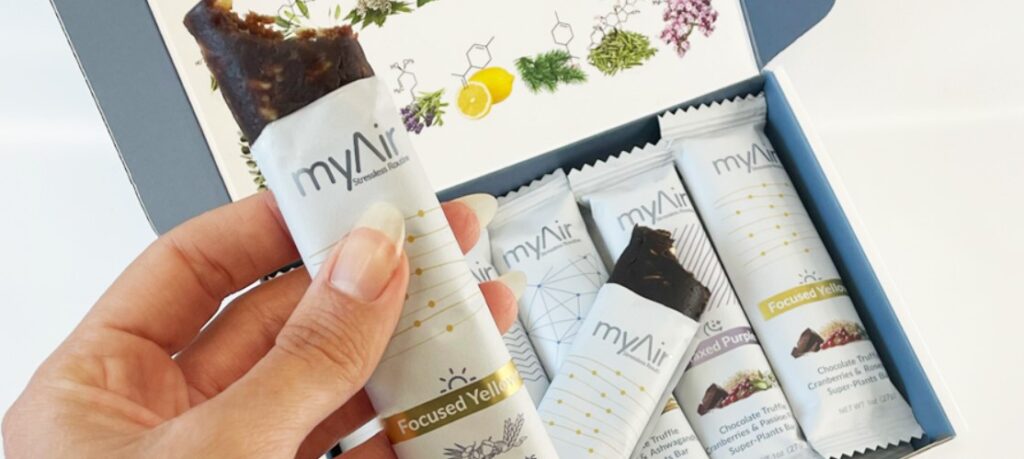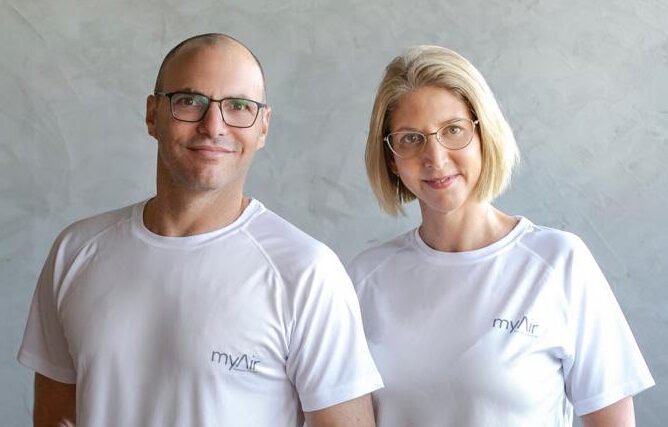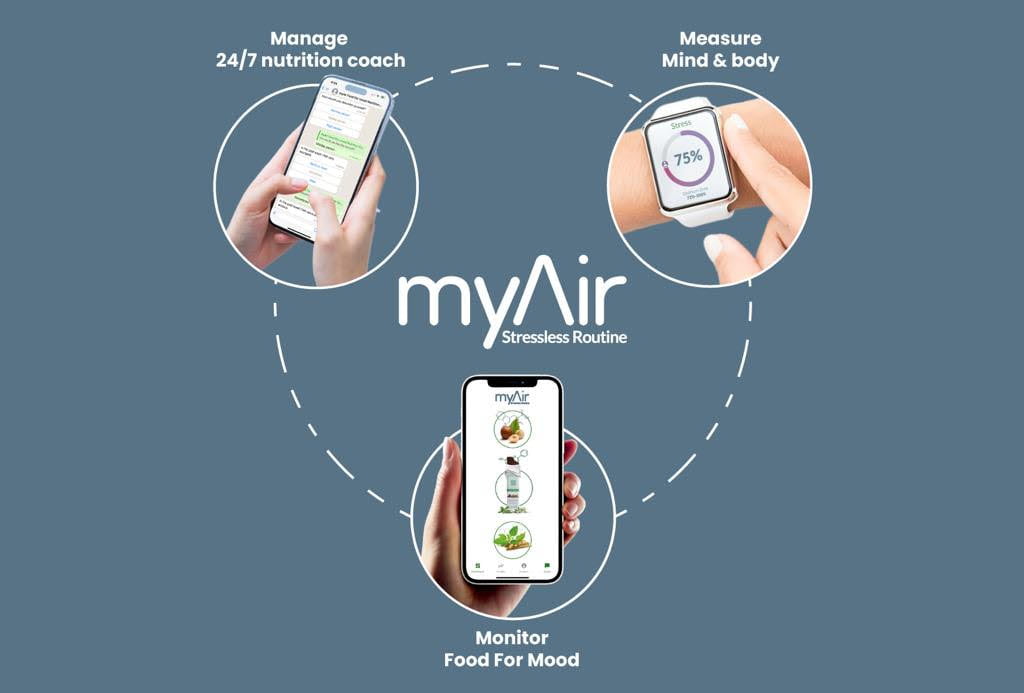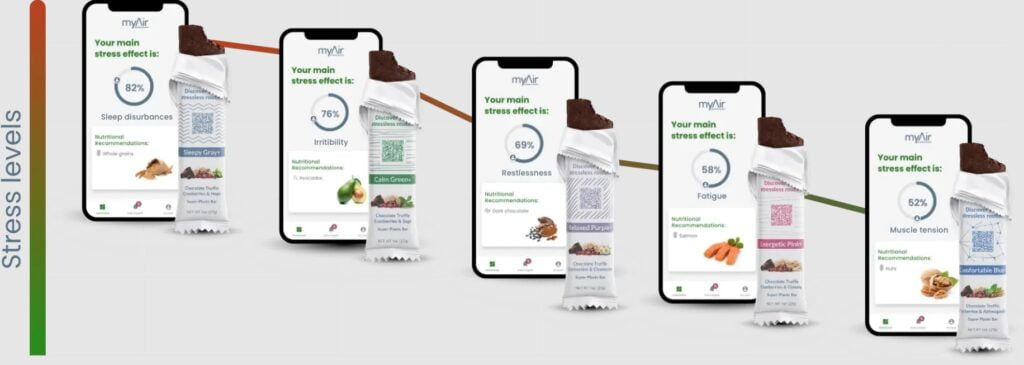In our high-octane, busy world, stress has become one of the biggest killers and managing it one of the biggest challenges. Finding ways to ease stress has spawned a multimillion dollar industry as many search for a way that works for them.
While the concept of changing bad habits in order to reduce stress is sound in theory, in practice people struggle when trying to adhere to a new lifestyle regime, says Rachel Yarcony, cofounder and CEO at Israel’s myAir smart food startup.

“We all know that we need to manage our wellness routine: we know how to manage our diet, measure calories, measure steps,” Yarcony tells NoCamels.
“But we don’t know how to measure our stress. Many people would like to have a meditation and mindfulness routine, and create a stressless routine, but most of us fail because behavioral change is very, very difficult.”
myAir posits that a healthy diet is key to easing stress and altering our disposition, arguing that good food equals a good mood.
“We are a platform to discover your stress. It’s so important you know to manage your stress, check your performance and balance your stress with your nutrition,” Yarcony says.
“Nutrition is at the heart of health,” she explains. “We are what we eat – everything starts from our nutrition. Seventy five percent of the population prefer to have better food than to take mood-altering drugs, so we created a solution that is based on personalization and functional tuition.”
And, according to Yarcony, “the best way to create a new habit is to attach it to a current habit that you really, really love to do.” As she says, “there is one habit that we all love to do, which is of course eating.”
The myAir program is based on a three-fold concept, combining a personalized database about each user with tailored nutritional advice and regular “fun” engagement to keep the user interested.
For the database, the startup employs artificial intelligence and data gathering to assess the best stress-busting diet for each individual person, according to their lifestyle, medical needs and exercise regimen.
“We created a personalization platform,” says Yarcony, explaining that they gather up to 80,000 pieces of information per day from a user’s smartwatch. The devices are very popular in the US, with around half of all Americans wearing a smartwatch on a regular basis.
Those who do not have a smartwatch are invited to fill in questionnaires to discover their “main stress effects” and other information that would otherwise be acquired through the device on their wrist.
Sign up for our free weekly newsletter
SubscribeThis data is then combined with a personal psychological profile that the company builds, using its unique artificial intelligence platform. “We created this algorithm that actually enables us to really give you insights about yourself,” Yarcony says.
The engagement features aim to keep the users’ interest in the program alive, and involves “lots of challenges, questions, fun things.”

The final of the three elements of the app is nutritional recommendations, put together by integrating the personal data that it has gathered with up-to-the-minute scientific research and delivering it through the AI platform, Yarcony says.
“You can have a chat 24/7 with the ‘food for mood’ nutritionist coach, which is cutting edge technology based on generative AI,” she says.
“This is the smartest nutritionist on Earth, because if you go to a nutritionist they will never have read all the science or all the research,” she says. “And this nutritionist combined your physiological data, psychological data and all the relevant science, to give you nutritional recommendations in a chat.”
Yarcony gives as an example her own bespoke menu for the day, which included salmon for dinner “because it contains the right hormone for me to boost my sleep and and then nuts that have melatonin. Every day I get nutrition recommendations that are based on my profile.”

The dietary advice is bolstered by the company’s own nutritional bars, a range of two dozen different formulations combining superfoods such as sage, cranberries and hazelnuts, as well as other nutrients. “The myAir algorithm chooses the formulation that you need, but you can choose the flavor” of either chocolate or date.
The range includes a “Daytime Zen Master” bar, which the company says is “made to elicit calmness and give you a cognitive boost,” and a “Bedtime Buddy” bar that is “made to give you mental clarity and alleviate stress.”
Yarcony herself is no stranger to the role food and medication play in our modern lives. She spent close to a decade working in senior roles for world-leading Israeli pharmaceutical firm Teva as well as more than 11 years as a manager at food giants Strauss and Nestlé.
It is through that experience that she realized that food is a more beneficial tool for controlling stress than any medication a doctor can prescribe.
Yarcony says she is not alone in this approach, describing the target audience for the app as people who “want to be healthy, but don’t have time; don’t want to take drugs, prefer to eat healthier.”
Related posts

Editors’ & Readers’ Choice: 10 Favorite NoCamels Articles

Forward Facing: What Does The Future Hold For Israeli High-Tech?

Impact Innovation: Israeli Startups That Could Shape Our Future




Facebook comments